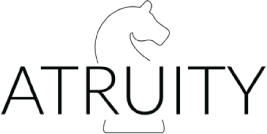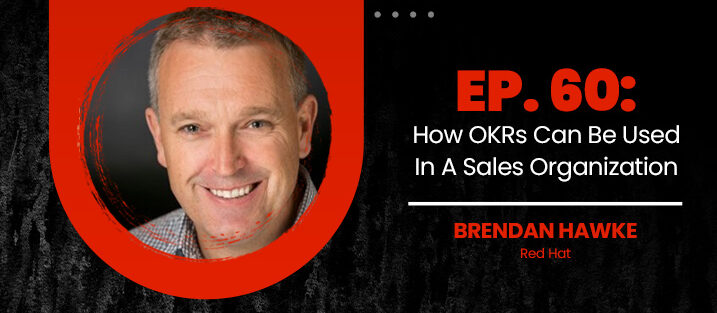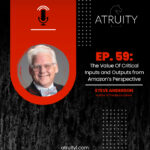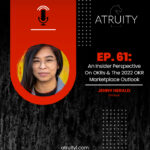OKRs Q&A Podcast Ep. 60: How OKRs Can Be Used in a Sales Organization | Brendan Hawke, Red Hat
In this exciting episode of the OKRs Q&A Podcast, Tim Meinhardt interviews Brendan Hawke, Red Hat’s Public Sector Sales Director and Branch Manager in Australia. Brendan shares his experiences with OKRs, how they are using their OKR program in regard to sales, and how to set customer centric OKRs to improve the selling process. He also discusses the challenges that he and his organization have faced using OKRs and how to overcome them.
To learn more about Brendan Hawke, visit his LinkedIn Profile:
https://www.linkedin.com/in/brendan-hawke-8644303a/
If you are interested in working with the Atruity team or have a question you would like addressed on the show, please email contact@atruity1.com or visit our website at www.atruity1.com
Tim Meinhardt:
Welcome everyone to another exciting episode of the OKRs Q&A Podcast, also known as the OKR Corral, where OKR insight is the king. I’m your host, Tim Meinhardt, President and CEO of Atruity, an OKR consultancy headquartered in our nation’s capital.
Before we begin, if you’re an OKR fan and enjoy our podcast, please subscribe, leave a review, and explore our website at www.atruity1.com. And finally, should you have a burning question you’d like addressed in future episodes, please drop us a note at contact@atruity1.com.
In this exciting episode I have the pleasure of speaking with Brendan Hawke. Brendan is Red Hat’s Public Sector Sales Director and Branch Manager in Australia. He’s been a colleague of mine for several years. Brendan enjoys our podcast and is an avid listener, now a valued contributor. In fact, his son, Thomas, was on our program recently talking about the Gen Z perspective on OKRs. Brendan’s organization embraced the OKR journey, helping his organization align themselves as they’ve scaled over the last several years. Brendan shares his experiences with OKRs and how they overcame challenges, and, more importantly, how they’re using the OKR program in sales as well in helping shape discussions and customer expectations in the selling process. I love this, and I find it very intriguing, and he and his friend Tony Hughes are big advocates for this approach. This is a jam-packed episode of super insightful and wonderful thoughts about OKRs and their applications to sales, alignment, and organizational growth. So please everyone, grab that cup of coffee, put in those earbuds, and enjoy my conversation with my good friend Brendan Hawke. So, Brendan, welcome to the program.
Brendan Hawke:
Hi, Tim. Pleasure to be here, mate. Eventually, we got here.
Tim Meinhardt:
So, tell our audience a little bit about yourself, and what are you up to these days?
Brendan Hawke:
Well, Tim, I’m just that sales guy with an absolute passion for selling and seeing the outcomes for my customer. It might sound a bit trite, but ultimately, I really have a passion for selling and sales and the sales craft. I think that Tony Hughes captured it the best way, opening being the new closing. It’s how you show up, how you open, it’s definitely the new closing. We’ve done a lot of work with Tony around that, and it’s really talking the language of your customer in how you present yourself and how you open up a conversation. OKRs have really helped us to get to that position to understand what our customers’ objectives are. And then when we do show up, we open with “How can we help you?” and talk their language.
Now we live in a world where people have a passion for selling, and we see some people say it is just like a blue-collar trade, but I see it as an absolute profession, and I’ve been doing it for 30 years now. I started out when I was a young kid of 16, working for an organization called Computer Land. I don’t know whether…I think it was a US franchise back in the day. I spent 14 years with Big Blue, which is probably exciting times for me; it was a fantastic organization, and I know they’re going through some changes at the moment, but it’s a great time to them. I spent a short stint with an organization called Pega and had a very good experience with a company called Veritas, which is backup software and archiving software, which is great. And now with Red Hat for the last three years heading up, they go to market strategy for public sector and really enjoying it. Love Red Hat, love the culture at Red Hat. People are just so open, and we’ll get on to that and talk about that, no doubt. But yeah, enjoying life at the moment. We’re making some big changes for the organization at the moment, and some positive ones—really aligned to our northern stars we spoke about before.
Tim Meinhardt:
Fantastic. So, Brendan, you’ve been using OKRs now for quite a while, and I know you’re a really, really big fan. So, tell our audience why they have proven so effective for your organization.
Brendan Hawke:
Well, it’s interesting, Tim, when I arrived at Red Hat, it was the first role that I really had, that was a branch manager in a large open manager role. And I was looking around; I was thinking about how could I do this job better? How could I help the people achieve their goals and their objectives, really? And I reached out to a guy in the US—David X, who is a good friend of yours and had been on the on the podcast before.
Tim Meinhardt:
Yes.
Brendan Hawke:
And David said, “Well, over in the US, we use these things called OKRs,” and I said, “What are OKRs?” And he said, “We’ll get results and really help our business align to our mission and where we want to go and make sure that everyone’s on the same page.” And so, we brought that concept that wasn’t really recognized in our part of the world over, and we got a group of like-minded individuals together within that leadership team in Canberra to develop our OKRs. And interestingly enough, we spent a fair bit of time trying to align what the objectives were. And we came up with three really key objectives. So, we had the first one was a financial objective, as most organizations have one, but they typically have a financial objective that is aligned to the corporate number or the plan number. Well, we really wanted to have a number that was like shooting for the stars; was a really audacious goal that said, “You know what would absolute success for us look like with this?” So, we put forward that large number and we brought down the key results that sat underneath that of various different parts of the business to achieve, namely their financial goals. And the second one that we had was really interesting—was culture. And culture is seen by people as an interesting thing where everyone has a culture.
I know that every organization has a type of culture, but in Red Hat, it was to really be the custodians of Red Hat’s culture. And we didn’t invent Red Hat’s culture, but we’re damn sure we’re going to leave it a better place, right? And that’s where we were. We were striving with that; was to see what were the key results that we could achieve and make that to make it better and improve on that. And the third one was being essential. And it’s being essential to our customer’s mission and our customer’s objectives and to make sure that we do things and show up, that we appreciate and understand their position and we empathize with it. And that the key results to that are built around our customer’s key objective and being essential to their mission and their Northern Stars.
Tim Meinhardt:
Yeah, absolutely. So, what did you find? And I’ll frame this question the right way. When you put something in, it’s always challenging first. So, what was the most challenging aspect of launching your OKR program, Brendan.
Brendan Hawke:
Well getting started was easy—it really was. And the funny thing about the objective part was really obvious to us, right? That was really obvious. And the funny thing…and I’ll get back to the challenges—during COVID what we found is that people dispersed and went into the virtual world, and we weren’t really doing team meetings anymore. We were doing more virtual with everyone. We say that we do them all the time in our industry, but really, we miss being together in the in the room and seeing people face to face, and what happened was that because everyone understood the objectives and where we were going, it was easier for us because when we shared it was less time spent on superfluous stuff, was more around that key vision of where we were, where we were going. But the challenge that we did have initially after we laid out the objectives was getting the consistency in the buy in from the teams that sat underneath that. So, it cascaded down the various different parts of the business.
We had different portfolios and those portfolios…the ones that were over, particularly last financial year, really successful. They made sure that at their fortnightly cadences or at their QBRs or at every team event that they did, that the OKRs were front and center and they set those goals upfront and said, “Make sure that what we talk about and where we’re going are aligned to these objectives and are measured against these key results,” and they laid those out, and the teams that did that proved to be extremely successful.
Tim Meinhardt:
Yeah. So, let’s talk a little bit about the challenges for a second. You and I were even talking offline that, you know, it’s one thing to get it going and do it once, but it’s another thing to do it consistently over time. And how has your organization done with the consistency aspect of things?
Brendan Hawke:
Oh geez, if I was to write it down out of ten, I’d say we’re not very consistent and I think that we would be five at best, really, and we’re looking to change that. I would see the value of it, but I think that different people in the organization embrace it in different ways. You know, I’m personally not really a big fan of the way people use KPIs. I liken it to if you’re a racing car driver and you’re racing around the track and you’re using KPIs and you’re not going to win the race because you’re too busy concentrating on the rear vision mirror and looking in the past, right? When you really need to look at is the corner that you’re racing up to at 200 miles an hour making sure that you hit that apex. So, to me, that’s the difference between the two—it’s all in the in the applications. And I think that’s where we are five because the organization uses it. We do locally in a very proactive way and in a very diligent way. It’s not really a policy within the broader business. And the funny part about it is that whenever it’s brought up at a more national level, people tend to lean forward to it and understand, and that’s the part that brings a wry grin to my face. People get that, right, so, but they don’t get that other stuff you’re talking about that’s happened in the past. It’s like that the past performance is not an indication of future performance, right? Which is pretty much the way I look at it.
Tim Meinhardt:
Before we continue with the interview. We’d like to tell you a little bit about Atruity.
Voiceover:
At Atruity we understand the challenge of implementing a successful OKR program. While the methodology may be straightforward and easy to understand, the implementation and execution of the program can seem daunting. Your team is concerned because you’re unsure how to properly implement or manage your OKR program. You are not alone. This is where Atruity comes in. We know how to implement an OKR program and are experts in OKR implementation and management. By using our proven methods and implementation structure, we can help you to successfully implement OKRs within your organization in as little as 30 days. If your organization is considering implementing OKRs or struggling with the management of the program, do not hesitate to reach out to us at contact@atruity1.com. Remember, no plan succeeds on its own—execution is everything.
Tim Meinhardt:
Getting people off the superfluous and getting them focused on a few key items. You know, COVID was probably just a wonderfully challenging event for salespeople, you know, as much as anything, because we’re used to people, and when you can’t be around people and you do need to have everybody rallying around certain things that are priorities, it certainly makes things challenging. Maybe what strategies did you employ to help get the buy in, Brendan, that you were looking for?
Brendan Hawke:
It’s an interesting question, and I’ll go back to when I first started at Red Hat, I sat down at the monthly meeting. I spent predominantly most of my career within IBM that had that type of very corporate structure, and I walked into an organization that was very open, believed in meritocracy, heavily believe in meritocracy at that point in time. And we had a branch meeting, and I spent a bit of time developing an agenda for that meeting. And we got up there and we kicked that off, and then a voice in the back of the room said “That’s not quite right. I think you can do a better job at that.” And I look at this guy, I said, “Who the hell is that? Who is that telling me how to do this?” They said it was Paul—Paul was the guy who did that, and it was from that moment I realized that this organization is special; there is no view they won’t hold back, they believe that the best idea should win on the day, and he had a better idea, and he had a better concept of how to construct the meeting. And you know, from that day on, I said, “Well, it’s gotta to be about the collective buy in,” you know? And so that cause is the same. It’s, you know, everyone has to believe that this is the right thing to do. So, I was sitting around the table and talking about, you know, these key results that sit under these objectives, or even the objectives, for example, if anyone believes that there is a higher objective that we had. We had a bit of a change with that when I first came on, was that the third objective we had was about being essential, was the first one that we had was about being the best untold story. At the time Red Hat was literally the best untold story in the market. But we moved into being essential and that was a change that was agreed from the broader team, and we put that forward to collective buy in.
Tim Meinhardt:
Yeah, you know, it’s that gaining of consensus is…I think it’s really one of the superpowers of OKRs is that, you know, there needs to be consensus. There needs to be, when you’re told to do something, you know versus, I choose to do something. You know, when you have input, when you’re empowered as an organization and as people. And I love that about Red Hat and its meritocracy is that everyone’s encouraged. You know, let’s talk this out, let’s get the best idea out in the open so that we can come to a, you know, a wonderful consensus among really smart people. And to me, that’s really part of the buy in. And I think that it really helps when an organization works towards and does that from a consensus based or consensual base environment.
So, tell me about OKRs in the selling situation, Brendan. This is where Tony and I, and you and I talked for months on end. And I just love that. I thought it was refreshing and I wanted to hear from you. Tell our audience a little bit about how are you using OKRs in the selling situation?
Brendan Hawke:
Well, that’s interesting, Tim. It was born of a concept—so we sat down, and we had our OKRs for our part of the business, and we’ve spoken about that during this podcast, but it’s really, you’re turning that around the other way. It’s really understanding what our customers’ OKRs are. And the challenge with that is that they might not embrace OKRs, they might not have heard anything about them, but underneath it, they really do have them. So, they have a key objective, but it’s your job as a seller, and to engage with the customer to understand what they are, and then understand what the key results are that sit underneath those objectives. And if you’re able to tease those out and understand what they are, then you’re able to put forward a point of view to that customer and then elevate the conversation that you’re having into one that’s relevant, that’s solving their challenges and their problems. And whilst that’s easy for me to sit here and say, it’s another thing to be able to execute on that and be able to bring that to the fore in a sales engagement.
Tim Meinhardt:
Yeah, you’re facilitating your own session of sorts to really dig deep, to try to understand what is going on with that organization and then frame it as we talked about with objectives and key results. All right. So, kind of the last question here, Brendan. What is the future look like for you and your OKR program?
Brendan Hawke:
Well, it’s coming up to the end of our financial year, so we’re revisiting everything. So, we’re revisiting our go-to market strategy where we’re doing a lot of education and a lot of training with the people within the business, we’re going through a restructure as you know, which is a great opportunity for us to level set. So, we’re open to change, and OKRs is definitely one of the items on the agenda that we’re revisiting. And with challenges coming up in the new year for us, so with COVID, our customers’ public sector and they have been handing out money like no tomorrow to help the economy, help the citizens, and they’re going through big changes. Now that we’re trying to reopen, that they’re going to have efficiency dividends put on them, they’re going to try and save money. So, we’ve got to readjust our thinking in how we can help them to achieve those goals, how we can help them to drive efficiency in their organization, how we can help them to save money. And our OKRs will be lined up against those. And understanding what, like I said, that’s their objectives on high. But how can we realign our sales strategy to that and really make a big difference? It’s the land of opportunity where there’s always changes, the birth of opportunity. But yeah, really looking forward to next year and really looking forward to seeing and revisiting the OKRs and hopefully engaging more with you in the in the new year.
Tim Meinhardt:
Well, that would be wonderful. Gosh, that would be fantastic. So, I’m going to leave this with kind of the question I ask everybody is what piece of insight would you give an organization that is either considering looking at an OKR program or is maybe in an OKR program that isn’t firing on all cylinders? What would you tell them based upon your experience with your current OKR program?
Brendan Hawke:
I would encourage most people, particularly at the back end of COVID, to stop, take a breath, have a look at what are you really here for? What is the purpose of your organization? What is your individual purpose and what is your objective? And then map that out in front of you and say, “Okay, well, where do I need to go?” and then start afresh. And I know that might sound like pretty simple, straightforward advice, but it’s like us—very simple. And for people who have never tried OKRs before, I encourage you spend some time looking at it, and really, like I said with the racing car analogy, it’s all about understanding what the objective is; measure what really matters. What matters to you, what matters to the organization? You can get caught up in so much of this noise that’s on the left and on the right of you or behind you, all right. But measure what really matters and focus on your key objectives.
Tim Meinhardt:
Yeah, focus and align, and execute, but Brendan, this was a lovely interview, and I thank you so much for doing this with us, and I will say that we now have had the father and the son on the program, which I think is fantastic, and I hope you have a wonderful holiday season, and thanks again for being on the program.
Brendan Hawke:
No, it’s actually a pleasure, Tim. And thanks to Stephanie. Cheers, mate.
Tim Meinhardt:
Cheers.
Thanks so much for taking a few minutes to listen to our OKRs Q&A Podcast. You know, OKRs provide such an excellent, agile framework which is critical for today’s business needs. It’s such a pleasure to have such wonderful people share their stories and journeys with us. Please, should you ever need assistance with your OKR journey, do not hesitate to reach out to us and contact us at www.atruity1.com, and make sure if you have a minute, to rate our show. Have a great week. Stay healthy. And of course, stay happy. Thanks, everyone.












